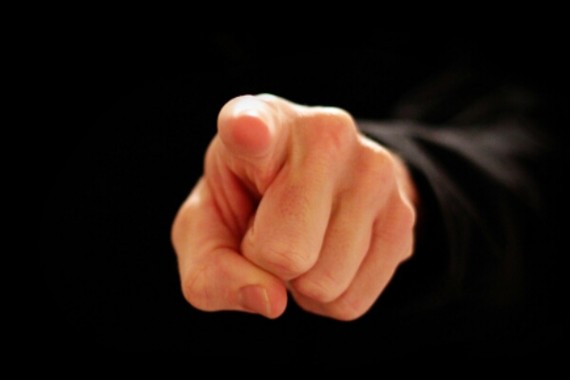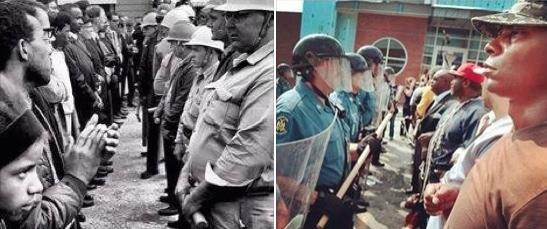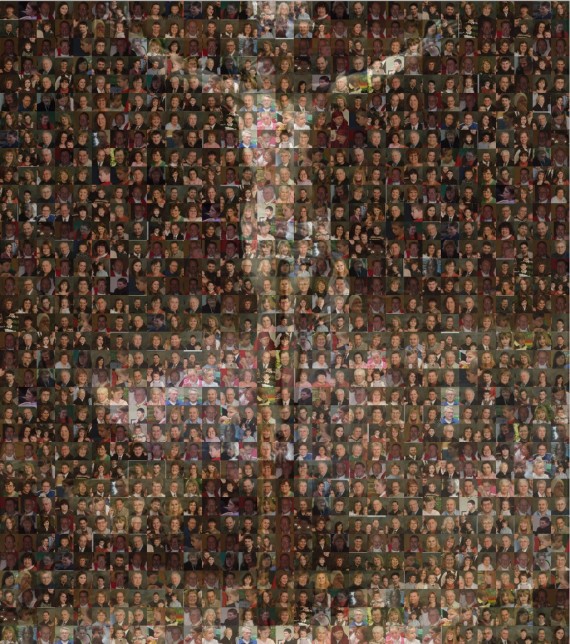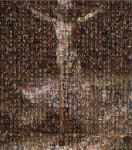People love to point fingers.
It’s been happening since the Garden of Eden when, after he ate from the Tree of the Knowledge of Good and Evil, Adam said to God, “The woman, whom you gave to me, gave me the fruit and I ate.” Adam not only blames Eve, but blames God as well.
When God turns to Eve, she said, “Don’t look at me! It was the serpent!” She also was implying that it was God’s fault. After all, didn’t God create the serpent and put it in the Garden?
Down through the eons of history, this approach has been our standard operating procedure. Every time something goes bad in our life, our family, our town, our country, or our world, everybody starts pointing the finger at everybody else.

Take the events in the Middle East for the past 20 years:
It’s the West’s fault for what is happening in the Middle East! Death to the great satan!
No, it’s the Muslims fault! Let’s blow them off the face of the earth!
No, it’s not Muslims; it’s only extremist Muslims.
Yeah, but Muslims only become extreme in reaction to Western abuse of power.
Who cares? Let’s kill ’em all and let God sort it out! (Have you ever seen this bumper sticker?)
The same sort of conversation happened during the “Occupy Wall Street” protests:
All those rich people are to blame for our county’s problems. They are stealing our money!
No we’re not! You are poor because you just want to sit out here, hold signs, and commit crimes!
But that’s only because we can’t get jobs because you are so greedy!
We can’t hire anybody because Obama — whom you voted into office — ruined our economy. It’s your own damn fault!
Then there are the recent events in Ferguson, MO:
You white people are always killing black people for no reason!
What? It was self-defense! And he was a criminal!
Self-defense?! You shot him six times! You’re all racist!
No, we’re trying to uphold the law. Look at you! You’re rioting and looting stores. You’re all criminals!

We could go on and on and on. This sort of exchange takes place every day in our lives, communities, job sites, and even families.
And you want to know what the solution is? Jesus showed it to us, if we have courage to look.
The solution is crucifixion … not of our enemies, but of ourselves.
Death truly is the answer … but not the death of our foes, but of me. I. Myself.
The church claims it follows Jesus, but we only want to follow Him if it leads to personal glory, pay raises, a higher standard of living, and the death and destruction of our enemies.
Nobody wants to follow Jesus into death; especially into death for our enemies … and maybe even at the hands of our enemies.
This is hard teaching, and frankly, I am not fully sure about how to live it out.
As I write this, my inner self is screaming, “But what does that mean, Jeremy?!” And frankly, I don’t know. Actually, I don’t think I want to know.
I am not ready to follow Jesus into death.
The idea terrifies me.
But I believe that following Jesus into death is the only way that violence and finger-pointing will ever end. As long as I refuse to own up to the violence and hatred in my own heart, I will forever be pointing the finger at someone else, saying, “They made me do it!”

It’s not the white man’s fault or the black man’s fault. It’s me.
It’s not the rich people or the poor people. It’s me.
It’s not the Muslims or the Christians. It’s me.
It’s not the Democrats or the Republicans. It’s me.
This is the first step in dying to ourselves. Recognizing that I am the one at fault, I am the one to blame, is the first step toward laying down our lives for others.
Racial tensions are at an all-time high. White people blame the black man, and black people blame the white man. But neither is at fault. I am the one at fault.
It is not “they” who must die, but me. If Jesus is our guide, we bring peace, not by killing others, but by laying down our lives for others, and especially for our enemies.
This post is part of the September 2014 Synchroblog. Below is a list of other bloggers who contributed to the Synchroblog this month. Go read them all and see what others have to say about race and violence.
- Wendy McCaig – Race, Violence, and a Silent White America
- Glenn Hager – Can We Even Talk About Racial Issues?
- Carol Kuniholm – Who is Allowed to Vote?
- Sarah Quezada – Race, Violence, and the Airport Immigration Agent
- Wesley Rotoll – Race, Violence, and Why We Need to Talk About It
- Kathy Escobar – We Have a Dream




I hear what your saying and certainly its true. The problem I have with it is that many Christians quit being critical thinkers because they fear being judgmental. This leads to apathy and an actual withdrawal from the world. “Be in the world but not of the world”. Then they get lazy and say what does it matter the rapture is coming. My answer to this is RESPONSIBILTY NOT BLAME- in other words evaluate situations and find the facts out and hold people responsible. By doing that you take out arbitrary judgment and yet avoid malaise and apathy.
Yes, absolutely. I think the big failure in modern culture is that nobody takes responsibility for their own actions. But I think this begins with each of us doing it ourselves.
Thank you Jeremy I love this. This has perhaps been the hardest thing I’ve ever had to deal with in my walk. I ask myself often things like “As a soldier how am I to feel about the situation with ISIS?” and “As a Christian how do I stand with God on issues like gay marriage and abortion while both sides are using propaganda and lies to cause pain and advance their cause.” The easy answer is to hate and judge, and most of the time I find myself seeking vengeance and venting against what I see as hypocrisy and abuse from those in power. To me it feels like those in power should be held to this kind of treatment because their actions have the most drastic consequences, but sometimes I scare myself with the things I think about them.
Recently I’ve been holding onto the fact that vengenace is the Lord’s and that although Jesus was the only one who had the right to call legions of angels against the abuse and slander that he suffered, he did not. Don’t let that scare you Jeremy. The God who saved and changed us is just as willing and mighty to save us from this, one of the deepest evils of human nature. Our part is to have faith and trust in Him. I gave up believing he would save me from my lust and my resulting sins after I had dealt with it for many years, sometimes wanting to change and other times not. But regardless of my failure He came through and helped me out, rewiring my brain and helping me resist temptations. I believe He will help us through this too, for all of us. Not only that but He will empower us to hold others to account and to do so righteously as Mark mentoned. Let’s all pray for each other who are struggling with this because this is what we need to overcome to become a light to the world again.
Bless those that curse you. This isn’t easy and it often requires an act of the will. When we are cursed by another we are rejected by them and the very natural thing is to reject then back. About 2 months ago someone put the contents of their vacuum cleaner in my recycling bin. I felt utterly rejected, dejected and very angry. As an act of the will I knelt and prayed God’s blessing and forgiveness on the person who had done this and I began to feel a lot better. I then went and in peace I cleaned out the bin. A small victory for the kingdom of God. There are bigger battles to be fought.
Justin,
You are in the military? You have a very difficult assignment. I have often wondered how I would follow Jesus if I was a soldier.
Either way, you have your finger on the pulse. It is not about hating others or scapegoating them for the problems of the world, but owning up to our own contribution to the problems… whatever that might be.
Hi Jeremy,
Yes I am in the military. I understand that there are strong arguments on both sides concerning Christians in the service so it is something I may not ever be able to fully understand or reconcile with. It seems to me that the government is given authority to use military and law enforcement in Romans, and I also shudder to think about what our history would have been like had our armed forces never existed. Honestly I think it comes down to one’s heart. I have met soldiers who are violent warmongers who love when their chance to kill and fight comes around while I have met others who pray for peace every night because of the horrors of war but perform their duties to protect others. There have been stories of soldiers who have gone out of their way to harm innocent civilians and others who after being captured helped to heal wounded opposing soldiers to the amazement of the guards. I would say that to follow Jesus in an increasingly secular military in violent times such as these is to treasure love, healing, and peace and to teach your fellow soldiers to do the same. It is also up to soldiers and civilians to carefully elect Godly leaders into office so that we will not be misused.
Well put. Dying to oneself is the hardest of everything. The worst part is getting old enough to realize that we can’t do even that in our own strength.
Yes! Dying to self is exactly what I’m talking about. And of course, there can be no resurrection without death.
“What” is the all encompassing 1st Cause for the creation of all things in existence, but proven with empirical validity of an oxymoron “infinitely perfect” character trait? (before religion or science)
Therefore, the monotheistic code/pattern to the life cycle of water that never ceases to exist but only changes into one of its three energy determined forms is a valid example of the “perfectly infinite” (oxymoron term) actuality of “matter”/“Hope”/”God.” Monotheism validly shows God as 3 in 1. God/Jesus/Holy Spirit is validly evidenced as “matter”/”human”/”oxygen” but in “E.O” the “Total Body” is “Hope”/”Love”/”Happiness”.
“Matter”/”God” cannot be created or destroyed, is everything and everywhere which, means “His” one and only ultimate (key word) “encompassing characteristic” is best described as “infinitely perfect.” Therefore, does “Hope” (not its result) validly share that characteristic too?
Selflessly,
Ps. This “infinitely perfect” characteristic must mean that the concept of “nothing”/”no-thing” is illogical and false because there cannot be an opposing entity existing outside of the 1st “Cause” circle of created existence. A basic global fundamental is the number zero (0) as merely a place holder which, truly describes the “actuality” of something as only “reduced” (in whatever form) from its existing “place.” What can ever be “created” after the already existing “1st Cause” of “matter?” (to create means “no-thing” had to exist, unlike to make)
https://www.facebook.com/notes/eternal-optimism/unique-design-cobination-explanation-of-chosen-value/10152275615365720
That is Daoist apologetics from a Christian pov.
I appreciate this reminder to “die to ourselves” as we approach challenging topics. It’s hard to do when we have opinions and experiences that affect us deeply. While I think this perspective is crucial on a microlevel for interpersonal conversations, I worry that its application to broader interactions ignores power dynamics. Having said that, though, I don’t think that means denying ourselves doesn’t apply on a larger scale, I just think power has to be taken into account. I wish I could articulate beyond that, but I think my words would be inadequate. I do highly recommend the book “Jesus and the Disinherited.” It had a huge impact on me many years ago, and one of the ideas that has stuck around all these years was recognizing the unique opportunity for those that are “disinherited” to contribute to reconciliation.
Sarah,
You are right. This post is overly simplistic in its approach. I fully admit that. There are so many social, cultural, religious, economic, and political factors at play in all these situations, it is hard to point at any one reason as the cause.
I will check out that book you recommend. It sounds good.
Perhaps one way to reconcile the role of the wider world and the responsibility of the individual is to ensure that we do strive to understand what is happening and ask where is the structural power, who does it benefit, who does it hurt etc and then see where I myself am located in this analysis. Sometimes I may be closer to the side of an oppressor, sometimes closer to being oppressed. My response will be different depending on this realisation. Do I need to give up some power, stand up for others, change my own behaviour, repent? I think you are right in identifying that simply blaming is not useful. And recognising that I may be complicit in a sinful situation of oppression, abuse etc is difficult to accept, but it will need to happen.
One thing that has really helped me recently is what CS Lewis often wrote to his friends.
He told them that world news often causes us to get so upset about what is going on around the world, that we decide we cannot do anything to fix the world problems, and so we end up doing nothing. God didn’t give us the capacity (physical, mental, or emotional) to deal with such large-scale problems. But what we can do is love our neighbor, serve our family, and work honestly at our jobs. This is how we take responsibility.
It’s not the solution to everything, but I think it is a move in the right direction.